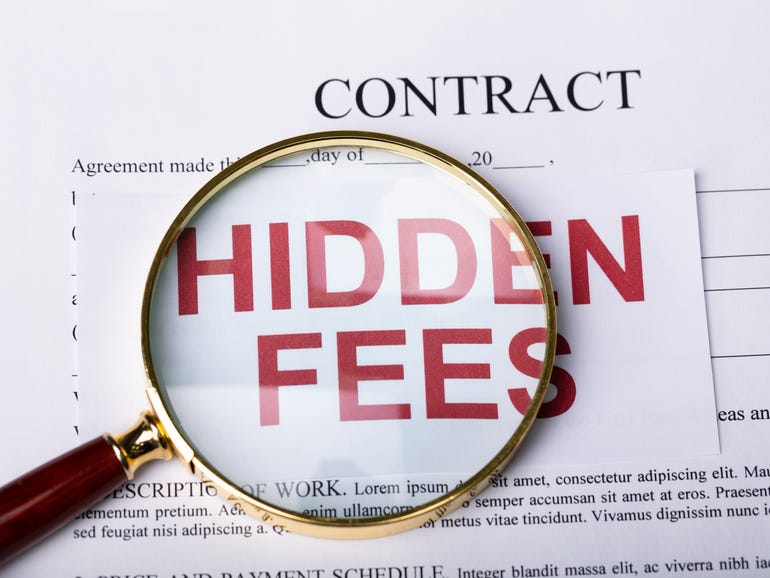Internet Fees: Your Guide To Hidden Costs

Internet bills are infamous for being riddled with hidden fees and additional costs. Some are avoidable, while others are industry standard. Either way, subscribers should know that the promotional monthly cost for internet service is never the full story. This guide is meant to demystify the most common additional charges and help you understand your internet fees.
Installation and activation fees
$10-$200
Your largest bill is likely your first one. Setting up internet service often comes with a few starter fees. Sometimes providers will include an activation fee in the installation costs, others might charge separately. Activation fees are typically around $10. If you opt to purchase your internet service over the phone instead of online, there's a fair chance the agent will waive some initial fees.
Installing your internet service costs money, too. Installation fees can cost up to $200. Self-installation is the cheaper end of the spectrum — it's free with providers like CenturyLink but could cost you as much as $35 with AT&T. If you self-install, you'll receive everything in the mail and follow instructions to plug in and connect your service. Professional installations are sometimes required and always more expensive ($50-$200). Many promotional packages for new customers waive the installation fees, and if you don't see a deal online, we'd recommend calling a representative.
Equipment rental fee
$5 to $15
You'll need a router and modem if you want your internet service to be wireless so you can connect any device via Wi-Fi. If you choose to rent this equipment from your internet provider, you'll be paying an additional monthly equipment fee. The cost usually falls between $5 and $15.
Or you can invest in your own wireless router to save money in the long run, and likely experience a smoother internet connection. Routers communicate on radio-like frequencies, so if all your neighbors are renting the same router from the local internet provider, there's a local increase in traffic.
Recovery fee
$1 to $4 per month
A recovery fee is more unique and may be hidden among other fees and taxes. As Patrick Ward, Editor-In-Chief of High Speed Experts explained it: "One of the most pernicious tactics is framing line items as 'taxes' or 'government' fees to misdirect consumer outrage such as 'internet cost recovery fees'. This particular fee goes towards maintenance and expansion of broadband networks which sounds great in theory, until you consider that's the idea of paying an initial bill for internet in the first place." The cost can range from $1-$4 per month, but internet packages have recently been leaving it off the docket after customer backlash.
Data overage fees
$10+
You'll only be charged a data overage fee if you go over your monthly internet data allotment. Ward told us that, "overage fees have surged in recent years. While ISPs claim they are put in place to reduce congestion, consumer advocates hypothesize it's a way for ISPs to offset their losses as consumers switch from traditional TV/Cable to streaming services."
The more demanding internet activity your household performs, such as video streaming, the larger the data allotment you'll need. You'll usually get a few courtesy warnings when you go over, but will eventually be charged about $10 for every additional 50 GB.
Late payment fee
Varies
Missing or delayed monthly payments will often result in a fee on the next bill. Most providers allow a few days slack if you've forgotten to pay your bill. After about a week or longer, a late fee will be applied, ranging from $10 to $25 or a percentage of the bill. We recommend setting up automatic payments online, so you'll never miss a bill. Some providers may offer a small discount for opting paperless, too.
Early termination fees
Varies
If you're moving or switching internet providers, breaking that contract could be costly. You may have to pay the remainder of the months your contract has left, or be charged a flat rate upwards of $300. Worried about commitment? Many providers offer no-contract plans at a higher monthly price, and some internet providers, like Spectrum, don't require contracts at all. Before signing a contract, consider how long you'll need the internet service and what it might cost you to cancel early — the monthly savings of a contract might not outweigh the cost of breaking that contract if you need to cancel.
Reassessing AI Investments: What The Correction In US Megacap Tech Stocks Signals
The recent correction in US megacap tech stocks, including giants like Nvidia, Tesla, Meta, and Alphabet, has sent rippl... Read more
AI Hype Meets Reality: Assessing The Impact Of Stock Declines On Future Tech Investments
Recent declines in the stock prices of major tech companies such as Nvidia, Tesla, Meta, and Alphabet have highlighted a... Read more
Technology Sector Fuels U.S. Economic Growth In Q2
The technology sector played a pivotal role in accelerating America's economic growth in the second quarter of 2024.The ... Read more
Tech Start-Ups Advised To Guard Against Foreign Investment Risks
The US National Counterintelligence and Security Center (NCSC) has advised American tech start-ups to be wary of foreign... Read more
Global IT Outage Threatens To Cost Insurers Billions
Largest disruption since 2017’s NotPetya malware attack highlights vulnerabilities.A recent global IT outage has cause... Read more
Global IT Outage Disrupts Airlines, Financial Services, And Media Groups
On Friday morning, a major IT outage caused widespread disruption across various sectors, including airlines, financial ... Read more

